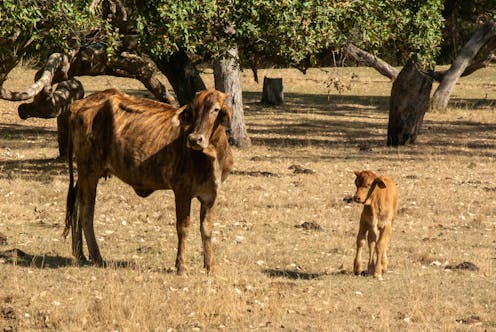Alan Jones v Scott Morrison on the question of how you feed a cow
- Written by Michelle Grattan, Professorial Fellow, University of Canberra

The last PM shock jock Alan Jones slapped down was Jacinda Ardern. His language was particularly offensive, advertisers deserted his program and he apologised to New Zealand’s leader. But at least Ardern didn’t have to endure the excoriating on-air encounter Scott Morrison had on Tuesday.
Jones unleashed his well-known tactics of lecturing and insult as he accused Morrison of failing the immediate needs of drought-striken farmers.
As Jones hectored Morrison, their battle came down to the repeated, and, for the seething Jones, existential question, “How does that feed a cow?”
Morrison had done his preparation. After Jones sent him a clip of a distressed caller from “back of Bourke”, Morrison rang the man, got the family’s full back story, and “took him through all the things we were doing”.
But – like many earlier targets of Jones’ wrath – Morrison found himself on the back foot in the face of the broadcaster’s tirade, which was replete with groans and the exasperated sigh.
As the Prime Minister threw up figures, Jones just wanted to know, “How does that feed a cow?”
Morrison said he’d like to answer - and he was sure the listeners would like to know - where the government money had gone, including funds to deal with pests and weeds.
Jones wasn’t moving from the groove. “How does that feed a cow? How does that feed a cow?”
“Alan, if you’ve got pests and weeds which are running over your property …”
This triggered the ultimate putdown. “Oh PM, don’t talk to me. I’m a farmer’s son – you’re not.” (On the putdown front, the water resources minister was written off as “the global warming advocate Littleproud”.)
In an exchange about household financial help, Jones told Morrison, “You go and tell Jenny that she can live on 250 bucks a week”.
Morrison objected, “it’s not just $250 a week, Alan”. He tried to elaborate, but Jones was back to basics, “How does that feed a cow and to keep it alive?”
When Morrison said that at this week’s National Farmers’ Federation (NFF) dinner a number of farmers had come up and thanked him for what the government was doing, Jones was dismissive. “Well, I must be talking to none of them”.
Jones moved on to the government’s former coordinator-general for drought, Stephen Day.
“You’ve got this Stephen Day…”, he said as Morrison, still trying to finish a previous point, vainly protested, “Alan, if you stop talking over me then I could probably answer your question”.
Jones wanted to know – as have many others, including the opposition - why Day’s report hadn’t been released.
“It’s coming through cabinet at present”, Morrison said, adding that it had already informed much of what the government had done.
“Well why can’t we see it? Why can’t we see the report?” Jones demanded.
Morrison waffled without providing an explanation beyond saying “cabinet is finalising its final response”. Instead, he tried to bring Jones on board by saying, “We both want the same thing. We want the farmers and the communities to be able to get through this drought” but the situation couldn’t be totally solved by “a magic cash splash”.
“We gave Indonesia a billion bucks without any questions [after the tsunami],” Jones said. “We’re doing seven times that,” Morrison replied.
Read more: Just because both sides support drought relief, doesn’t mean it's right
Eventually the marathon ended when Jones said, “I don’t know whether it suits either of us but we’re beaten by the bell”.
The verbal boxing match brought to mind the time another 2GB shock jock, Ray Hadley, challenged Morrison over his loyalty, after Malcolm Turnbull’s coup against Tony Abbott, insisting he swear on a bible (that Morrison couldn’t find in the studio).
Morrison grabbed the issue of drought as a priority as soon as he became PM; since then, there has been a flurry of announcements and promises. Large funds have been allocated, although smoke and mirrors mean the $7 billion total is not quite what it seems.
There’s been tooing and froing between the government and the NFF, and argument about whether what the government has done amounts to a “drought policy”.
The opposition homed in on drought at Tuesday’s question time; earlier, David Littleproud gave the Coalition party room a presentation of the three parts of the government’s approach, which Morrison also outlined at the NFF dinner: immediate help to farming families, assistance for local communities, and measures for long term resilience.
Some 11 MPs spoke in the party room, where one subject was the need for those in metropolitan areas to understand more fully what the government is doing to help. As Victorian Liberal backbencher Russell Broadbent told parliament last month: “We who live on the coastal lands actually care about what’s happening to people in drought-affected areas.” They felt that if there was more to be done, it should be, he said.
Authors: Michelle Grattan, Professorial Fellow, University of Canberra





